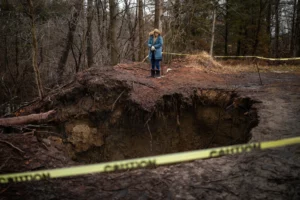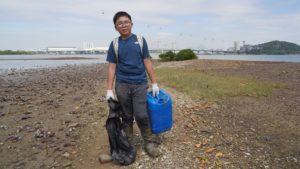India’s masks choke lakes and beaches as treatment facilities fall short
Since September last year, Mr Subhash Chandran, 32, has been diving off Rushikonda Beach to clean up its seabed in the coastal city of Visakhapatnam in Andhra Pradesh.
Last year, the scuba diving instructor and his friends removed over 21 tonnes of plastic in 61 four-hour-long dives.
Last month, when the volunteers did their first underwater clean-up during the pandemic, they found a jumble of masks, gloves and emptied medicine sachets.
“Normally we find a lot of plastic bottles and wrappers. After the pandemic we found 1,500kg of mostly N95 masks, surgical masks, tablet packets and gloves. I consider the ocean my second home but it is a Covid dump yard today,” Mr Chandran said.
Medical waste, already growing at a rate of 7 per cent annually pre-pandemic, has exploded with the profusion of plastic protective gear to battle coronavirus transmission.
According to the Central Pollution Control Board, India has generated 18,006 tonnes of biomedical waste from June to September. This includes personal protective equipment (PPE) such as gloves, face masks, head covers, plastic coveralls and hazmat suits, as well as syringes and other items used by healthcare providers and patients.
On average, India generated about 101 tonnes of Covid-19 related bio-medical waste a day in June. This rose to 183 tonnes per day in September. This is in addition to 609 metric tonnes of regular bio-medical waste generated per day (as of June, 2020).
Experts say the rise in waste generation is directly related to the number of cases. India has recorded over 9.8 million Covid cases.
From 25 tonnes a day in May, Delhi generated 371 tonnes of biomedical waste per day in June – a 1,400 per cent increase.
During the elections held during the pandemic in October, polling personnel and voters in the northern state of Bihar generated nearly 160 tonnes of gloves, face masks and empty sanitiser bottles, poll authorities said.
In response to the pandemic, the environment ministry and pollution control departments published guidelines for the management of waste generated during treatment, diagnosis and quarantine of Covid-19 patients. They advocate using double layered bags for disposal, mandatory labelling of bags and containers as “Covid-19 waste”, regular disinfection of dedicated trolleys, and separate record keeping of waste generated from isolation wards.
These are in addition to existing rules for biomedical management from 2016, which mandate colour coded segregation of different medical waste. Covid waste is now supposed to go into yellow bins.
But few follow these rules. Waste management experts say that proper segregation and disposal has been seriously neglected in India.
“Used masks must be disinfected with sodium hypochlorite solution, left for 72 hours, mutilated (cut or torn), covered in a paper and then thrown in regular bins. Some hospitals and commercial establishments follow the rules somewhat, but households and clinics are quite lax,” said Ms Pinky Chandra, a member of citizen alliance Hasiru Dala that promotes waste segregation in Bangalore and works with city authorities to help dispose of waste.
While more Indians are using washable cloth masks, which “greatly reduces the waste generated”, she said each of Bangalore’s over 120 waste collection centres have been seeing at least 300 pieces of masks every day.
When admitted to a hospital for Covid treatment in Chennai, environmental engineer Prabhakaran V noticed that his used masks, bedspreads and gloves were disposed of as “Corona waste”, but the paper cups, plates and bottles patients used went into the regular bins.
His colleagues in the Chennai non-profit Poovulagin Nanbargal reported masks, syringes, blood bags and testing equipment dumped along the coast in parts of Chennai, and floating in lakes. They found mountains of untreated medical waste in landfills.
“Before Covid, a government hospital bed generated about half a kilo of medical waste a day. Now it is 3-5kg a day. Almost 75 per cent of biomedical waste in Chennai goes without treatment into landfills,” Mr Prabhakaran said.
Ms Chandra said: “Under Covid, we are seeing an expansion of our existing solid waste management problems: wasteful behaviour that generates a lot of garbage, and gaps in implementation of laws for collection and disposal.”
India has 198 Common Bio-medical Waste Treatment Facilities for treating and disposing Covid-19 bio-medical waste. But these are proving inadequate.
Tamil Nadu, for instance, has only eight common biomedical waste treatment facilities, with a capacity of 31 tonnes a day. The state, however, generated 47 tonnes a day, before the pandemic.
This piece was produced by The Straits Times and shared as part of the World News Day initiative




